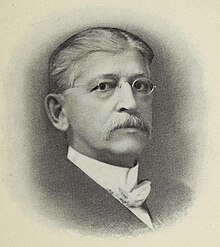Aaron Bliss
| Aaron T. Bliss | |
|---|---|
 |
|
| 25th Governor of Michigan | |
|
In office January 1, 1901 – January 1, 1905 |
|
| Lieutenant |
Orrin W. Robinson Alexander Maitland |
| Preceded by | Hazen S. Pingree |
| Succeeded by | Fred M. Warner |
| Member of the U.S. House of Representatives from Michigan's 8th district |
|
|
In office March 4, 1889 – March 3, 1891 |
|
| Preceded by | Timothy E. Tarsney |
| Succeeded by | Henry M. Youmans |
| Member of the Michigan Senate | |
|
In office 1883-1889 |
|
| Personal details | |
| Born | May 22, 1837 Peterboro, New York |
| Died | September 16, 1906 (aged 69) Milwaukee, Wisconsin |
| Political party | Republican |
| Spouse(s) | Allaseba Phelps |
Aaron Thomas Bliss (May 22, 1837 – September 16, 1906) was a U.S. Representative from and the 25th Governor of the US state of Michigan, and was from Saginaw. Bliss Township was named after him.
Bliss was born to Lyman and Anna M. (Chaffee) Bliss in Peterboro, New York and attended the common schools. He was employed as a clerk in a store in Morrisville, New York, in 1853 and 1854 and with the $100 he made there he attended a select school in Munnsville, New York, in 1854. The following year, Bliss moved to Bouckville, a small town in Madison County, New York, where he engaged in mercantile pursuits.
During the American Civil War, Bliss enlisted as a private in the Peterman Guards of the Tenth New York Volunteer Cavalry, October 1, 1861, and reported for duty at Elmira, New York. After a quick advancement to lieutenant, his regiment formed a part of Kilpatrick’s Brigade and was ordered to the front, joining the Army of the Potomac. He commanded a squadron from Washington, D.C. during the Second Battle of Bull Run and his rank advanced to captain. He also fought in the battle of Fredericksburg, the Wilderness, Petersburg, Ground Squirrel Church, Stony Creek, South Mountain, Falls Church and Warrenton. Then he was captured on General Wilson’s raid near Richmond. For six months he was held at the Confederate prisons of Andersonville, Georgia, Charleston, South Carolina, Macon, Georgia, and Columbia, South Carolina, where on November 29, 1864, like the man who would later precede him as governor, Hazen S. Pingree, Bliss escaped from a Confederate prison. He walked near three weeks until he reached General Sherman’s army at Savannah, Georgia, just two days before its evacuation. Bliss soon rejoined his own command at Petersburg, Virginia, where he remained until the war ended.
...
Wikipedia
